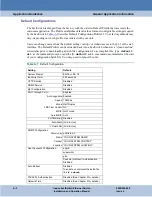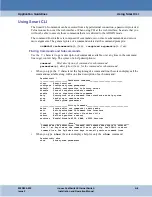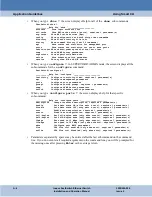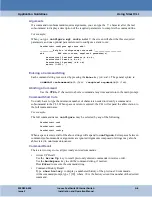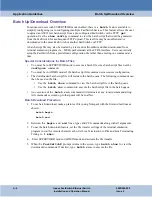
Additional Features
Authentication Protocol
200R204-000
Innovx FastSwitch Ethernet Switch
5-5
Issue 2
Installation and Operation Manual
Fallback Option
FastSwitch’s authentication strategy uses , if so configured, but the device will revert to
local authentication (default) if the server is unreachable or not responding due to
network outage, server down, etc. In such situations, authentication falls back to FastSwitch’s local
list of 20 usernames and passwords. For users who insist on using only , FastSwitch
provides a fallback option which blocks local authentication. The fallback option command is:
configure fallback enable
[or
disable
]
Note
IMPORTANT! Disable the Fallback option with caution. If authentication is being used with
fallback disabled option and the server becomes unreachable, you will be locked out of all
authentication until the server is reachable again. Therefore, disable this option with caution.
If you have disabled the fallback option and the does not respond, remains unreachable
or there is a configuration error (key, IP address, etc.), you will have to default all configuration to
factory defaults as described below.
1. From the console (craft) port, power cycle the unit by typing:
reboot
2. During power cycle and while the unzip dots are being displayed on the screen, type:
menu
3. After the unzip completes, a three line menu appears. Command the FastSwitch to load factory
defaults by typing:
L
4. Use the default passwords to reconfigure the FastSwitch from scratch.
Note
Disabling the fallback option is only supported in FastSwitch devices at Firmware Version 2.6.0 and higher.
Special Considerations
•
In order to change local authentication configuration values or enable and configure
authentication, ADMIN access is required.
•
In the event of an incorrectly configured key, or missing ADMIN or SUPERVISOR entries at
the server, a lockout condition may occur, preventing any access to the FastSwitch
device. To restore control, wait for the FastSwitch to timeout its attempts to reach a server; this
will force FastSwitch to revert to local authentication. Repeat the Configuration
procedure using the corrected values.
•
Up to five servers may be specified:
•
In applications with a single server, if the server does not respond, the
FastSwitch will revert to local authentication.
•
In applications with redundant servers, the FastSwitch device will look for
the first responding server, starting with the first configured IP, then the
second configure IP, and so on. When a server responds, the default key will be used if
the per-server key is not specified.
•
An authentication timeout will occur when the server is unreachable, when the
service is not responding, or if the server IP address is incorrect. The
default timeout value will be used if the per-server timeout is not specified.
•
When using authentication, the prompts for username/password will be capitalized:
Username, Password.
When using local authentication, the prompts for username/password will not be capitalized:
username, password.
•
The
configure testing
commands work for both local authentication and
authentication.
Summary of Contents for FastSwitch
Page 61: ......


























